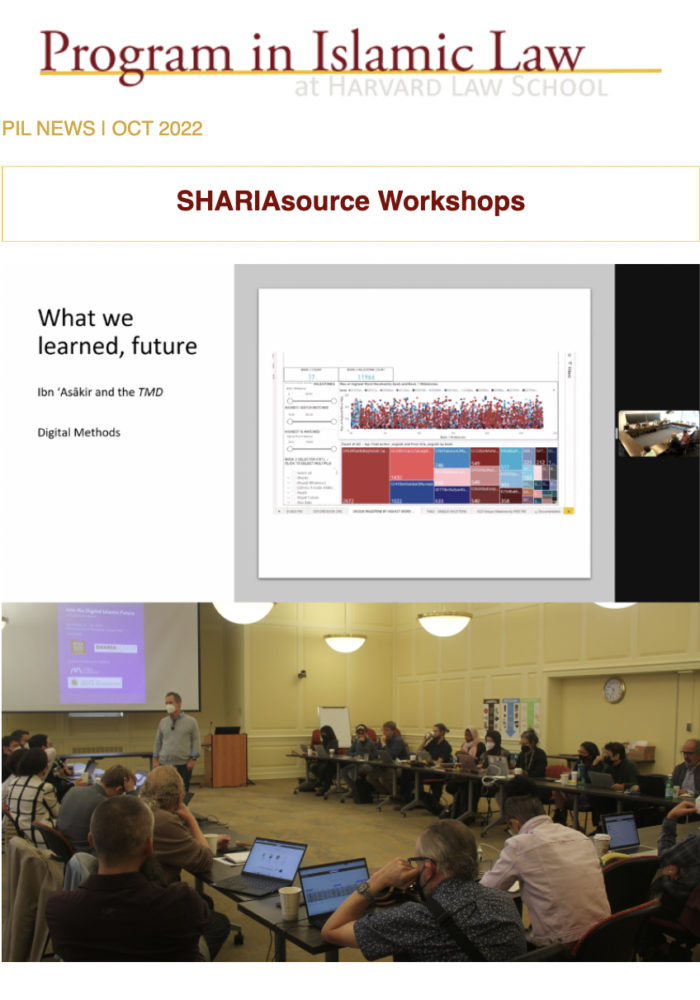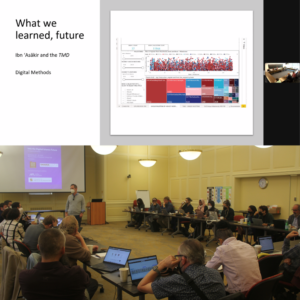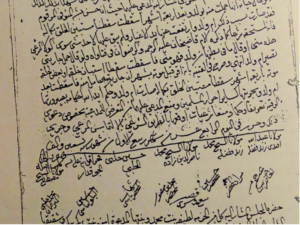
 SHARIAsource Workshops Last month, we began the semester with an exciting slate of events in the SHARIAsource Lab! We started with a Lab Workshop on Ibn ʿAsākir and His History of Damascus: Named Entity Recognition and Text Reuse led by Sarah Bowen Savant (Aga Khan University) on Tuesday, September 27th. The workshop explored an ongoing project that examines the question: prior to the arrival of the printing press or electricity, how were authors working in Arabic so prolific? Savant focused on the many earlier sources that Ibn ʿAsākir (d. 571/1176 ) cited in his The History of Damascus (Taʾrīkh Madīnat Dimashq). At the end of September, we co-convened an OpenITI-SHARIAsource Experts Workshop for building Arabic corpora with machine-readable texts and the future of the Open Islamicate Texts Initiative (OpenITI), co-organized by its principal investigators Matthew Thomas Miller (University of Maryland, College Park), Intisar Rabb (Harvard Law School), Maxim Romanov (University of Vienna), and Sarah Bowen Savant (Aga Khan University). Held on September 29 and 30, the workshop, called ‘Into the Digital Islamic Future,’ was held in-person on the University of Maryland, College Park’s campus. We invited some 30 researchers from around the world to share results from, discuss, and test the results of the first phase of the OpenITI Arabic OCR Catalyst Project (OpenITI AOCP).
SHARIAsource Workshops Last month, we began the semester with an exciting slate of events in the SHARIAsource Lab! We started with a Lab Workshop on Ibn ʿAsākir and His History of Damascus: Named Entity Recognition and Text Reuse led by Sarah Bowen Savant (Aga Khan University) on Tuesday, September 27th. The workshop explored an ongoing project that examines the question: prior to the arrival of the printing press or electricity, how were authors working in Arabic so prolific? Savant focused on the many earlier sources that Ibn ʿAsākir (d. 571/1176 ) cited in his The History of Damascus (Taʾrīkh Madīnat Dimashq). At the end of September, we co-convened an OpenITI-SHARIAsource Experts Workshop for building Arabic corpora with machine-readable texts and the future of the Open Islamicate Texts Initiative (OpenITI), co-organized by its principal investigators Matthew Thomas Miller (University of Maryland, College Park), Intisar Rabb (Harvard Law School), Maxim Romanov (University of Vienna), and Sarah Bowen Savant (Aga Khan University). Held on September 29 and 30, the workshop, called ‘Into the Digital Islamic Future,’ was held in-person on the University of Maryland, College Park’s campus. We invited some 30 researchers from around the world to share results from, discuss, and test the results of the first phase of the OpenITI Arabic OCR Catalyst Project (OpenITI AOCP).
 CONTENT: Raziya bt. Abdallah v. Hafiza bt. RecebThe SHARIAsource Portal provides access to primary and secondary sources of Islamic law and history, which scholars often compile and wish to share, to support teaching and collaborative research on salient issues in the field. Professor Zoe Griffith (Baruch College) recently contributed a court record, from the Islamic court of Tripoli (Lebanon) in April 1679. The case addresses the fate of an enslaved woman in the household of a recently deceased provincial Janissary. In summary, the enslaved woman, Raziya bt. Abdallah, argued and successfully won her manumission through the legal norm of umm walad, in which an enslaved woman who bears her master’s child should be manumitted after his death. As Radiya explains, she miscarried after a four-month pregnancy. Based on a fatwa and some rather extraordinary witness testimony, the judge agreed that Radiya held the status of umm walad, even though she was never visibly pregnant and did not give birth to a baby. Explore the source today.
CONTENT: Raziya bt. Abdallah v. Hafiza bt. RecebThe SHARIAsource Portal provides access to primary and secondary sources of Islamic law and history, which scholars often compile and wish to share, to support teaching and collaborative research on salient issues in the field. Professor Zoe Griffith (Baruch College) recently contributed a court record, from the Islamic court of Tripoli (Lebanon) in April 1679. The case addresses the fate of an enslaved woman in the household of a recently deceased provincial Janissary. In summary, the enslaved woman, Raziya bt. Abdallah, argued and successfully won her manumission through the legal norm of umm walad, in which an enslaved woman who bears her master’s child should be manumitted after his death. As Radiya explains, she miscarried after a four-month pregnancy. Based on a fatwa and some rather extraordinary witness testimony, the judge agreed that Radiya held the status of umm walad, even though she was never visibly pregnant and did not give birth to a baby. Explore the source today. CONTEXT: A Former Concubine Wins her Manumission in CourtThe Islamic Law Blog offers space for scholars to comment on sources of Islamic law and history, including those that they might feature on the SHARIAsource Portal. Last month, Professor Zoe Griffith (Baruch College) published a commentary on the case of Raziya bt. Abdallah v. Hafiza bt. Receb, in which a former concubine, Raziya, went to court and won manumission through a claim to umm walad status following a miscarriage rather than a birth, as was the typical Islamic legal norm. In her analysis of the case, Griffith reflects on the court’s close attention to the timing and description of Raziya’s pregnancy, and argues that the case presents a twist on a well-known point of Islamic law surrounding questions of enslavement and manumission. Cases like that of Raziya, Prof. Griffith says, and the court’s novel approach to an old legal norm, raise a number of questions about how enslaved people and households “made use of Islamic law in … highly sensitive matters.”
CONTEXT: A Former Concubine Wins her Manumission in CourtThe Islamic Law Blog offers space for scholars to comment on sources of Islamic law and history, including those that they might feature on the SHARIAsource Portal. Last month, Professor Zoe Griffith (Baruch College) published a commentary on the case of Raziya bt. Abdallah v. Hafiza bt. Receb, in which a former concubine, Raziya, went to court and won manumission through a claim to umm walad status following a miscarriage rather than a birth, as was the typical Islamic legal norm. In her analysis of the case, Griffith reflects on the court’s close attention to the timing and description of Raziya’s pregnancy, and argues that the case presents a twist on a well-known point of Islamic law surrounding questions of enslavement and manumission. Cases like that of Raziya, Prof. Griffith says, and the court’s novel approach to an old legal norm, raise a number of questions about how enslaved people and households “made use of Islamic law in … highly sensitive matters.”
See the full newsletter.

